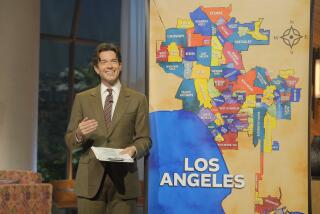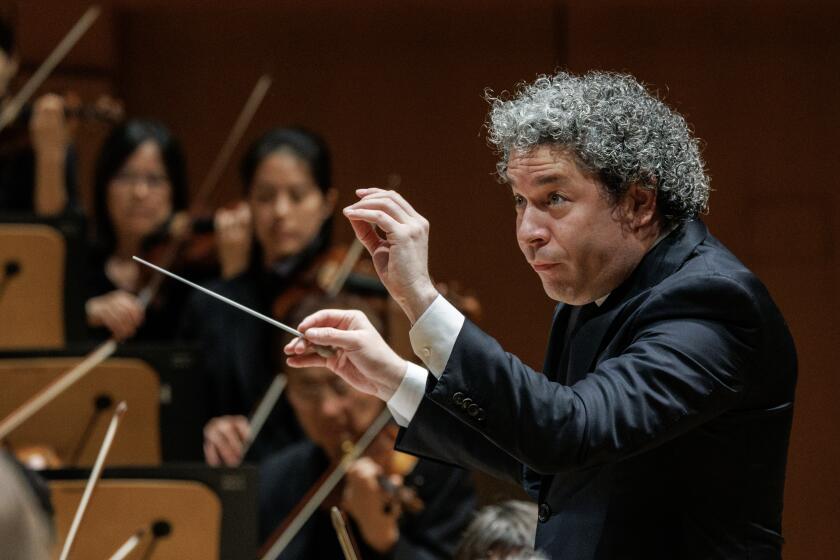Sekou Sundiata, 58; poet and spoken-word artist explored life’s adversities
The bridge that connects the Black Arts Movement of the 1960s with spoken word artists of today was crafted by poets like Sekou Sundiata.
In the 1960s Sundiata was a young boy living in Harlem, coming of age during a time when the movement’s giants -- Amiri Baraka, Sonia Sanchez and Nikki Giovanni -- were transforming poetry. As an adult he carried the work forward as they had, wrestling with identity, history and the lives of black people in America.
But poetry from Sundiata was more often backed by music, melded with theater and combined with dance. That approach resonated with a new generation of poets that would make poetry slams and open mike performances a phenomenon, so much so that Greg Tate of the Village Voice once wrote of Sundiata: “He is to contemporary African American poetry what Marvin Gaye was to modern soul.... If Homer were a black man born in the projects, he would be this tall, fearsome-looking poet.”
Sundiata died July 18 of heart failure at Westchester Medical Center in New York, said April Silver, a family spokeswoman. He was 58.
“Sekou was a man of varied and extraordinary talent who never accepted a facile judgment, always preferring to challenge and provoke and wrestle with the most difficult questions,” said a statement released by Bob Kerrey, president of the New School, and Jonathan Veitch, dean of the New School’s Eugene Lang College in New York, where Sundiata taught.
In the “the 51st (dream) state,” which the New York Times described as a “mosaic of poetry, music, dance and videotaped interviews,” the poet seeks to answer the question of what it means to be an American in the aftermath of 9/11. For two years Sundiata traveled the country, engaging in discussion about citizenship. The piece premiered in 2006.
The work “Udu” examines the state of ancient and modern-day slavery in Africa, a largely untold and complex story.
“This piece attempts to break down the long-running seductive narrative about slavery being black and white,” he told a reporter for the Minneapolis Star Tribune in 2000.
The poet’s struggles with kidney failure provoked the creation of an acclaimed work, “blessing the boats,” which opened in 2002 in New York and toured nationally. Untreated hypertension left Sundiata terribly ill -- “exiled from the self I had come to know,” he said. For a year and a half he was on dialysis and on a national list to receive a kidney from a donor, when five of his friends stepped forward to offer him one of their kidneys.
That experience became a story of friendship, love, mortality, identity and “unearned grace,” he said, given that he had done nothing to earn the gift of a new kidney, and never could.
“When these offers were made to me, a darkness lifted; I could see a clearing,” Sundiata wrote in a 2004 issue of Update, the bimonthly magazine of the United Network for Organ Sharing.
“This was the first inkling that there was something fresh and compelling in my personal story. There is nothing new in another story about grace. Yet it always renews.”
In 1999 Sundiata received a kidney from his manager and friend Katea Stitt. He had recovered and returned to performing when he was involved in a car accident and broke his neck.
After that experience he began working in earnest on “blessing the boats,” borrowing the title -- and the metaphor -- from a poem by Lucille Clifton, who also had a kidney transplant. The one-man show blends theatrical monologue, literary reading, stand-up comedy, spoken word performance and storytelling.
“How do you just wake up one day, and not be who you think you are? I’ll tell you how. The body is a lowdown dirty sneak. It remembers every physical or psychological insult it ever suffered, and each insult leaves a scar, and that scar is a map to the insult that just lays in the cut like a memorial.... Your body will break you down. It will make you beg.”
Sundiata was born Robert Franklin Feaster on Aug. 22, 1948. As a student at the City College of New York he helped found a newspaper for African American students and protested for an open-admissions policy that would accept all students, even those who suffered academic shortfalls and required remedial classes. He changed his name in the late ‘60s and in 1979 earned a master’s degree in English from the City University of New York.
Respect for his work spanned generations. Baraka once called Sundiata “one of the most distinctive and original djali [poet, historian, musician, signifier] doing it.... As serious as light overhead in darkness.” Sundiata was featured in Bill Moyers’ PBS series on poetry, “The Language of Life,” and in Russell Simmons’ Def Poetry Jam on HBO, according to his producer’s website.
“Sundiata was a bright spirit,” said Kamau Daaood, a Los Angeles poet and a founder of the World Stage, a performance arts gallery in Leimert Park. “His life was like a hard and beautiful poem.”
Sundiata is survived by his wife, Maurine Knighton; a daughter, Myisha Gomez; stepdaughters Dina Gomez and Aida Riddle; his mother, Virginia Feaster; brothers William Walter Feaster and Ronald Eugene Feaster; and a sister, Devona.
Memorial donations may be made to the National Kidney Foundation, 30 E. 33rd St., Suite 1100, New York, NY 10016.
--
More to Read
The biggest entertainment stories
Get our big stories about Hollywood, film, television, music, arts, culture and more right in your inbox as soon as they publish.
You may occasionally receive promotional content from the Los Angeles Times.






